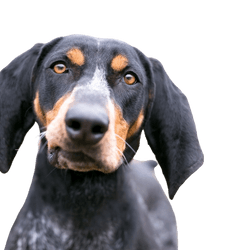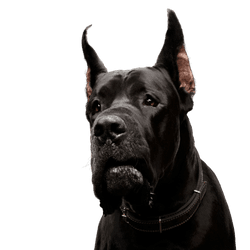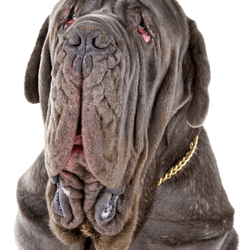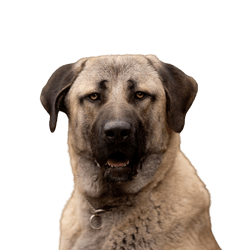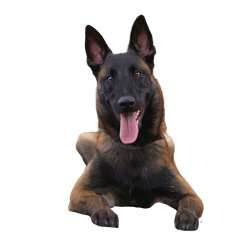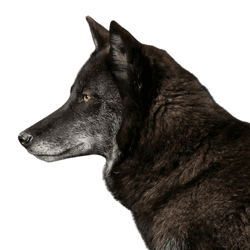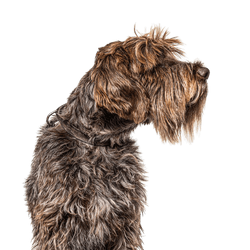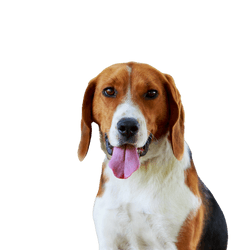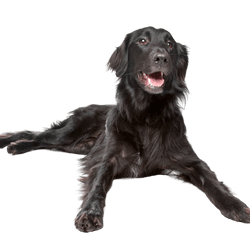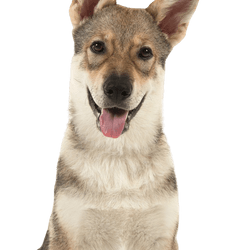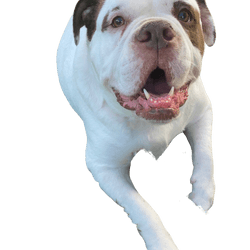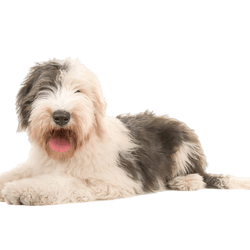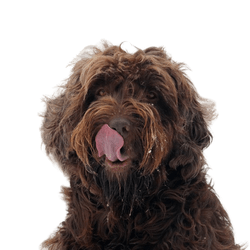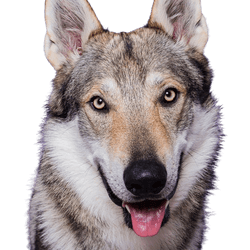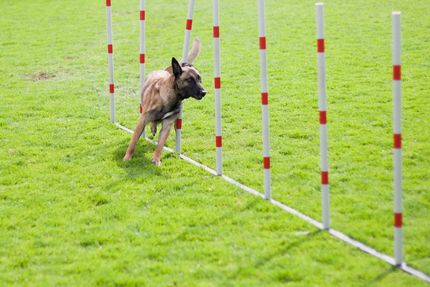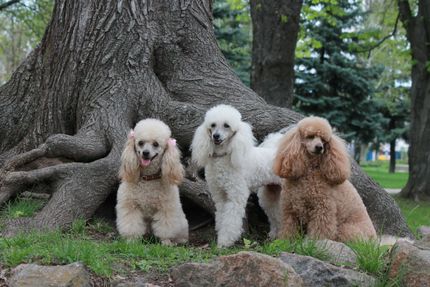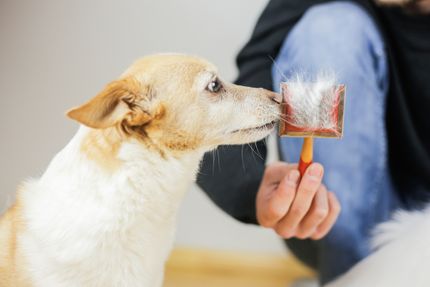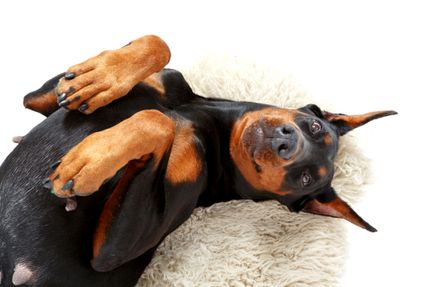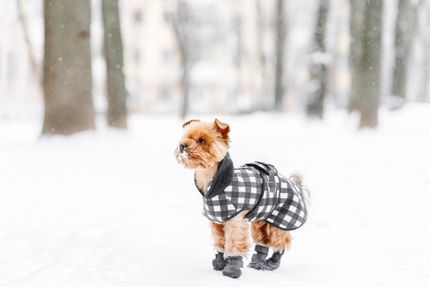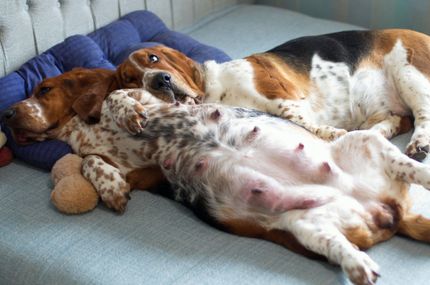
Rottweiler Breed description: Character & Co
Rottweiler
Facts & Origin
Where does the Rottweiler originate from?
The Rottweiler is a German dog breed recognised by the FCI which belongs to the FCI Group 2 (Pinscher and Schnauzer - Molossoid - Swiss Mountain and Cattle Dogs), Section 2.1 (Great Dane dogs), Standard No. 147, dogs with working test. It is assumed that the ancestors of the Rottweiler were dogs of Roman shepherds. It is known however, that this dog breed was mainly bred in the former imperial city of Rottweil (today's Baden-Württemberg) and its surroundings. This is where the name of the dog breed comes from. The city of Rottweil was a recognised cattle trading centre, from where the herds were brought all the way to Strasbourg. It was the task of the Rottweiler to keep the herds together and protect them.
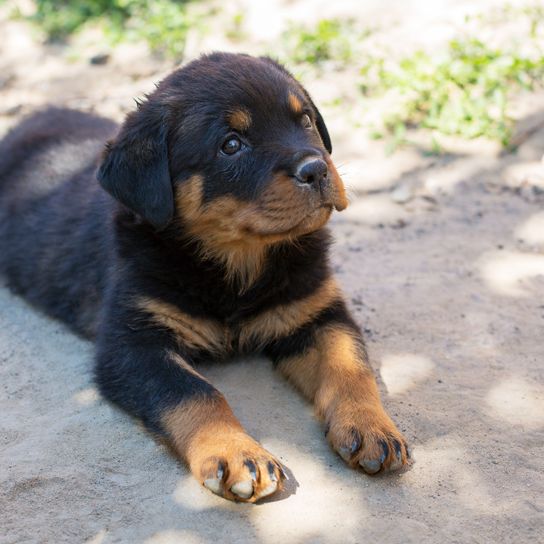
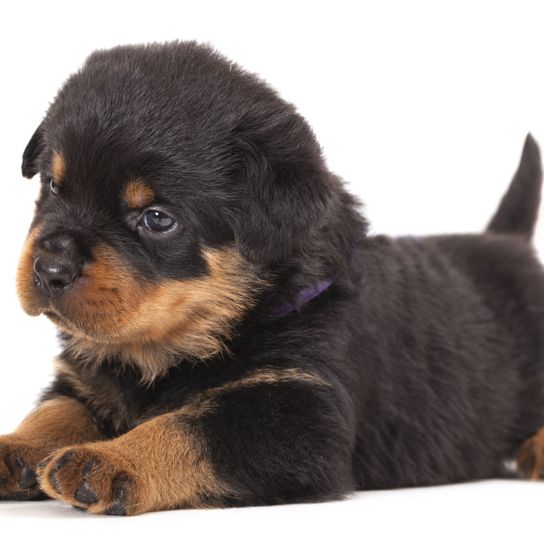
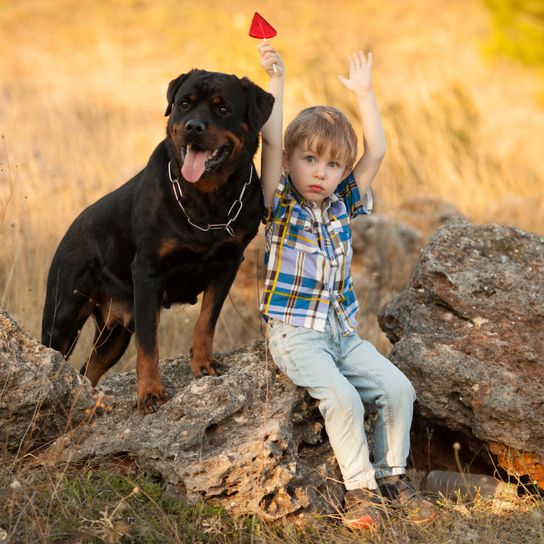
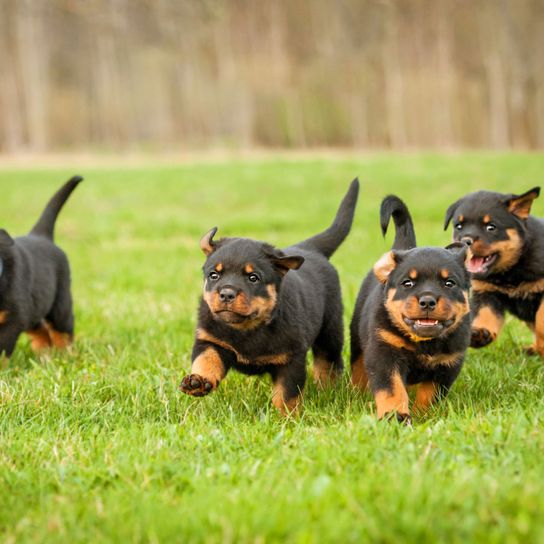
| Alternate Name | Rottweiler , Rottie |
| Origin | Germany |
| Life expectancy | 8 - 10 years |
| Care requirements | low-maintenance |
| Activity level | average |
| FCI group | Molossian type |
| AKC group | working group |
| KC group | working group |
Rottweiler mixes
Attitude, character and temperament of the breed
Breed characteristics and temperament of the Rottweiler
Prominent characteristics of this breed are their loyalty, fearlessness, strength and reliability. The Rottweiler is a self-confident, extremely alert and attentive dog, with a pronounced willingness to defend itself and a great sense of courage. This makes this dog an excellent protection and utility dog, which is why it is nowadays mainly used by protection services or the police. Despite its appearance, the Rottweiler is a peaceful and obedient dog when trained well. This affectionate, easy to lead and work-loving utility dog is very popular with dog owners, especially the police and military.
Attitude and upbringing?
The Rottweiler is not recommendable for first-time dog owners. They belong in the hands of an experienced dog owner with an appropriate amount of assertiveness. The dog's naturally pronounced self-confidence can easily turn into dominant behaviour. In some federal states (e.g. Hesse, Bavaria, Brandenburg, Hamburg and North Rhine-Westphalia) the Rottweiler is considered a list dog, i.e. it is classified as dangerous due to its breed characteristics. For list dogs, a permission requirement and a character test is necessary. Despite its classification as a list dog, the Rottweiler is a good-natured dog, which is also fond of children and is therefore often kept as a family dog. Reports of biting attacks by Rottweiler dogs occur regularly, but such incidents are mostly due to a bad upbringing and keeping as well as insufficient socialisation of the dogs. Some experts also recommend that the Rottweiler should wear a muzzle in public for safety reasons. If you're considering this, it is best to get your dog used to it early and make sure that the muzzle fits them comfortably. With this dog breed, however, a consistent education from puppy age onwards is of great importance. Only with absolutely consistent behaviour by the dog owner, whom the dog perceives as an authority, it will learn to behave correctly. An early socialisation of the Rottweiler puppies is also part of training. The right behaviour around strangers and other dogs must be learned. If you want to get a Rottweiler puppy, the attending of a dog school is recommended to be able to train your dog correctly. If you are looking for a dog to protect you in tricky situations, the Rottweiler is a good choice, always provided you show them who their master is, otherwise they will take the lead themselves.
Character
Usage
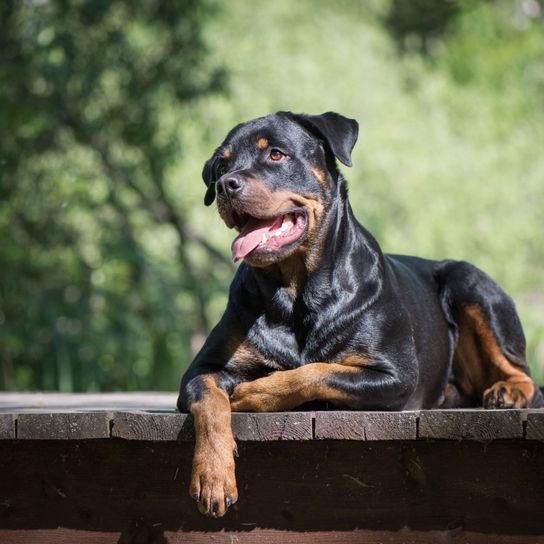
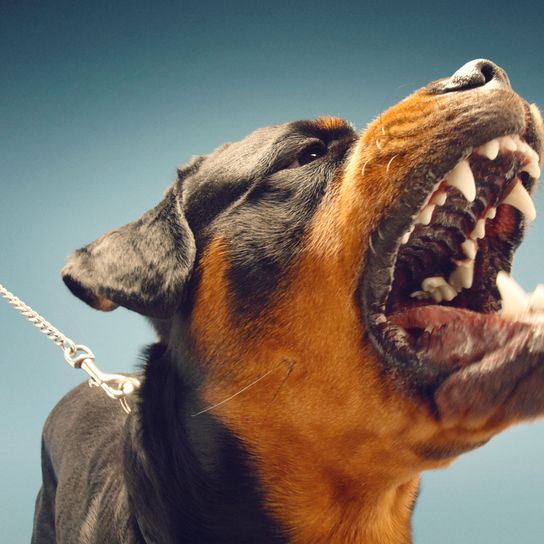
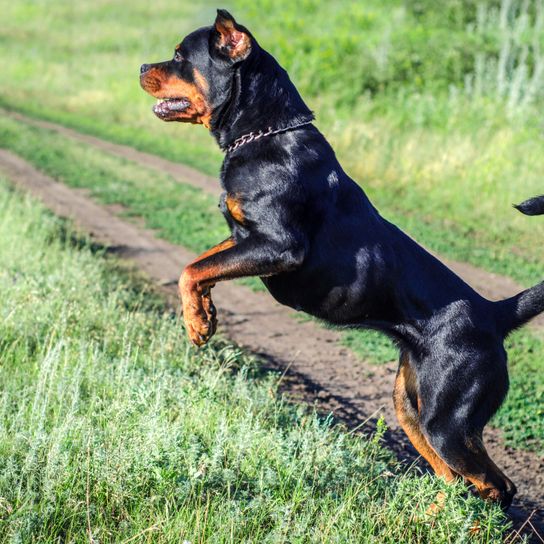
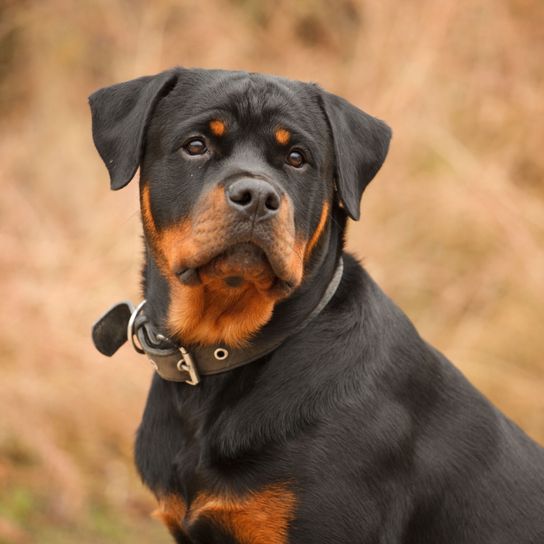

Health and breeding information
Buying a Rottweiler
You can buy a Rottweiler, rescue a Rottweiler or dedicate yourself to Rottweiler breeding. If you have decided to buy a Rottweiler, you need to find a reputable breeder.
A Rottweiler costs around 1000 Euro, if it comes from good breeding. Mixed breeds and dogs from a breeding without papers are of course cheaper. However, unexpected medical conditions are more likely to occur. Inform yourself well and think about where your priorities lie.
Alternatively, you can of course look for a suitable dog from an animal shelter. In any case, these dogs deserve a second chance, since they usually get into this unfortunate situation through no fault of their own. If dog owners become ill or die or simply do not have enough time for their dog, the best case scenario is that they end up in an animal shelter. If you adopt a Rottweiler from a shelter, you should be aware that you may not be getting yourself into an easy task. Not least because some of these dogs are traumatised. For breeding Rottweilers you usually need a permission of the responsible veterinary office according to paragraph 11 paragraph 1 No. 3a of the animal protection law (TierSchG). This is the case if you want to breed or sell dogs commercially.
Care and health
The coat care of the Rottweiler is simple. Occasional brushing is sufficient. In addition to this, you need to look after their teeth and regularly check their ears. The latter is important to protect the drooping ears of the dog from inflammation. Rottweilers are normally not very prone to diseases. The life expectancy of healthy dogs is about 9 - 10 years. But there are some breed related diseases:
- Heart problems: Many Rottweilers suffer from heart vein constriction and heart failure. These dogs tire quickly, get out of breath and suffer from cardiac arrhythmia. This disease is hereditary.
- Degenerative spinal cord inflammation. This is an injury of the spine, which causes fluid to accumulate in blood vessels and causes inflammation. Inflammation is caused by improper, messy movements.
- Hip joint (HD) and elbow dysplasia (ED): These are malformations of joint balls or acetabular cups in the hip region or a maldevelopment of the forearms. HD is usually caused by hereditary defects. The ED is often caused by excessive strain of the dog's elbows (e.g. frequently climbing stairs).
- Osteochondrosis: This disease results in a disturbed cartilage detachment of the joint. The dog walks unsteadily and limps. The causes are hereditary defects, circulatory disorders or excessive stress.


Appearance
The males reach a height of 61-68 cm measured at the withers and a weight of approx. 50 kg. The bitches reach a height of 56-63 cm measured at the withers and a weight of about 42 kg. The coat of the Rottweiler is short, dense and of black colour with well defined markings of reddish-brown colouring on the cheeks, mouth, eyebrows, under the base of the tail as well as on the chest and legs.
| Fur length | short |
| Fur | flat coated |
| Ear shape | Triangle |
| Tail | lang |
| Anatomy | rugged, massive, square, hefty |
| Size ♀ | 56 - 63 cm |
| Weight ♀ | 35 - 48 kg |
| Size ♂ | 61 - 68 cm |
| Weight ♂ | 50 - 60 kg |
| Suitable For | - |
Colors
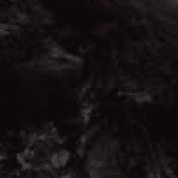
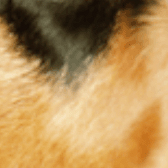





Known Diseases
Elbow dysplasia (ED)
Elbow joint dysplasia is a chronic disease complex of the elbow joint of fast growing dog breeds.
Joint damage
In some breeds, joint damage can occur later in life, affecting the musculoskeletal system.
Heart disease
Can occur frequently in dogs and can sometimes be treated with medication.
Hip dysplasia (HD)
The hip dysplasia or hip joint dysplasia of the dog (HD) is a maldevelopment of the hip joint.
FAQ
-
Yes, the Rottweiler makes a great family dog with good training.
-
The Rottweiler has a very strong bite and is considered a list dog.
-
The Rotti is very intelligent and can judge situations very well by himself, needs and demands training.
-
Yes, the Rottweiler is a listed dog in some states in Austria, Germany and Switzerland and is popularly known as a fighting dog.
Sources and relevant links
Embark
Accessed on 24.01.2023
Offizielle Seite des FCI
Accessed on 24.01.2023
Horst Hegewald-Kawich (2015). Hunderassen von A bis Z: Über 200 beliebte Rassen aus aller Welt. Gräfe und Unzer Verlag.
Gabriele Lehari (2004). Ulmers Großes Lexikon der Hunderassen. Ulmer.
Allgemeiner Deutscher Rottweiler-Klub e.V.
Accessed on 24.01.2023
Other large dogs
Useful Articles
You can find articles that might interest you in the dogbible blog to match your favorite breed.
Visit our magazineto stay up to date on dog trends.
To find out more, view our Privacy Policy
Find here the breed that suits you and find out what character traits it has. Here you can also learn more about the origin, size and weight of your favorite breeds.
Matching your favorite breed, you'll find articles that might interest you on the dogbible dog blog.
Alopecia in dogs - causes, symptoms, diagnosis, prevention and treatment.
Shortening the claws of a dog - this is what you have to pay attention to
Real Nature dog food - experience review and is it really that good?





